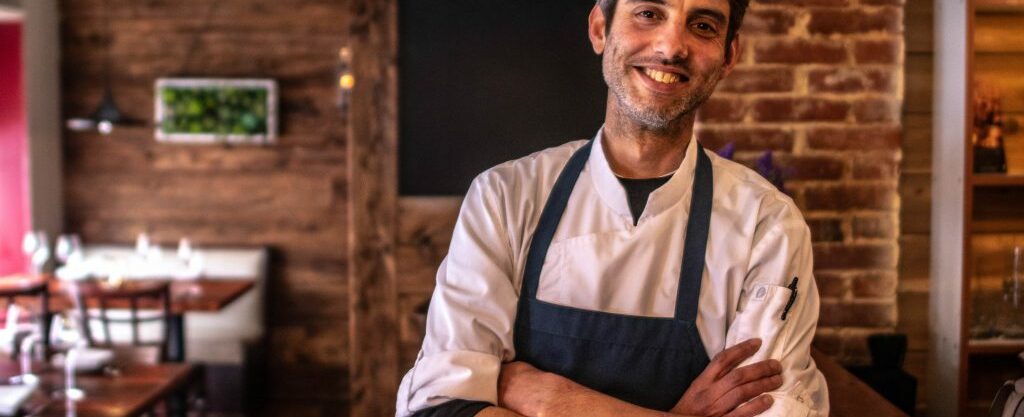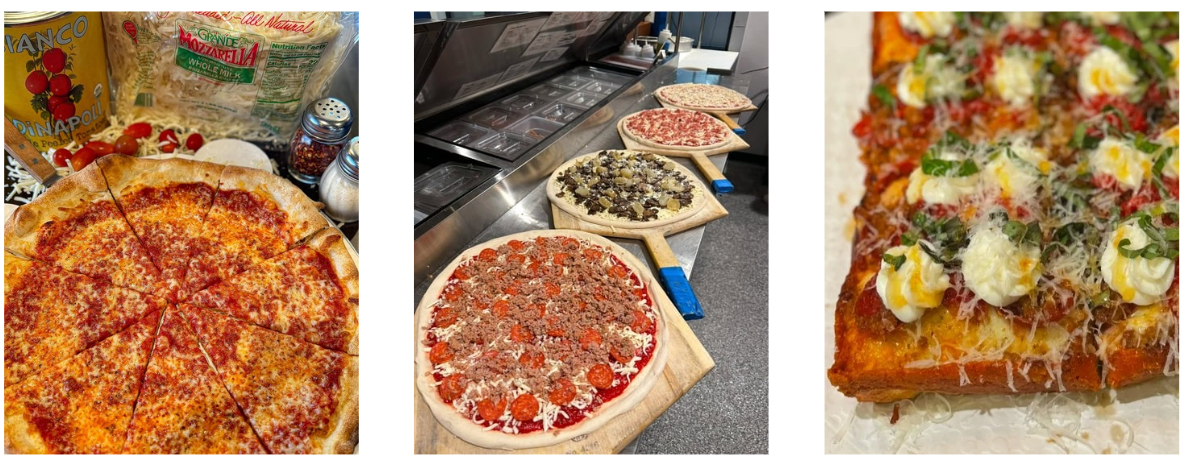Chef Scott Morozin only uses whole fish—and he uses the whole fish. There isn’t a jar or a can in the Verbena kitchen, where fish bones simmer for the consommé, hand-tied roasts cook to perfection in a slow oven, and every part of the plant lends some flavor, texture, or color to the dish. Morozin is meticulous, disciplined, and focused in his quest for what he calls “an organic, soulful balance” in his food. There are no shortcuts. Verbena BYOB’s serious but humble chef-owner is full of respect—for the process and for the food, but also for his team and for his guests.
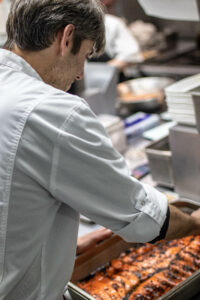
Chef Scott Morozin works with “a nice piece of salmon. We only use whole fish,” he says.
Morozin, an Aston native and Culinary Institute of America graduate, has always wanted to cook. “There was something greater than myself at work with that one,” he says with a smile. He grew up absorbing the aromas, tastes, and heat in his grandmother’s kitchen, and over the years he’s carefully chosen great chefs as mentors and worked in numerous kitchens to hone his craft. As a recovering addict, he also credits cooking with saving his life. When he gets to do what he loves to do, he says, “Everything else fades. The sounds are there, the pace is fast. There’s passion, accuracy, intensity, and everyone’s together on one beat. It’s like a flock of ducks on the water—the surface is still, but it’s all churning underneath. I’m not looking for that feeling—it’s there.
Morozin’s dream of owning a restaurant came true when Verbena opened in 2018—in the midst of a snowstorm on Valentine’s Day. He reflects on his first year in Kennett Square with a wry smile. “It’s been full of challenges and successes,” he says. “We hit every emotion along the way. Some nights are fun, full of glorious successes as every member of this dedicated team steps up to the plate and communicates well when the going gets tough.” The Saturday evening of Restaurant Week in February was one such night. “It’s always easier to cook in a busy restaurant,” he says.
As he continues to reach towards realizing his full potential as a chef-owner, Morozin is getting acclimated to Kennett Square as well—to its vibe and calendar and rhythm. “I have to be ready for walk-ins, reservations—and curve balls,” he says. “We’re still evolving and getting better. I don’t ever want to put my feet up. It’s a great feeling that there’s more to do.” He’s also pleased to meet more and more locals who are discovering, and loving, Verbena.
The Terroir of Carrots
Morozin tries to use as many local ingredients as possible, and he’s pleased to be developing relationships within the Pennsylvania farming community. “Farmers will call to tell me they’re cutting greens in an hour and ask if I can come.” When a chef approaches food ethically and responsibly, he says, the menu, like the local farming economy, is weather-dependent. This approach brings transcendent taste experiences—including Flying Plow Farm’s carrots. “Carrots from Flying Plow Farm in Maryland taste like carrots should taste—not watery or crumbly like what pass for carrots in the supermarket,” he says. “I want to put a carrot on a plate and tell people where it’s from, that it was in the dirt three hours ago.” Carrots grown in that particular dirt at Flying Plow Farm, with its unique composition and mix of organic matter, as well as cold temperatures and other growing conditions, will taste like no other carrots. The concept of terroir, which is widely accepted as it applies to viticulture, applies to all crops. “The terroir of carrots—that’s real,” he says.
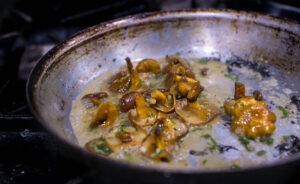
Locavore flavors at Verbena BYOB include Kennett Square mushrooms.
The chef’s responsibility, Morozin says, is to cook what the farmers grow. “If a farmer asks me, ‘What are you looking for?’ I turn that around and ask, ‘What do you have?’” If the product is good, he feels ethically compelled to use it—whether that means maximizing the two pounds of carrots that are available or creating a dish that brings forward all the flavors and textures of a bumper crop. Verbena’s menu is always changing to reflect this seasonality. Depending on local crops brings challenges as well. “Last year was always too . . . something,” Morozin says. But he’s passionate about bringing out the very best in what he has.
Thoughtful Intention
Morozin is intentional and perceptive about who he is in the kitchen. “I empathically reflect onto my food,” he says. “It’s involuntary—I can’t disguise my mood. It’s about artistic design and emotional approach. Those two things will always shine through. If the sauce is neat and tidy on the plate, it’s a good day. If I were to eat a dish that was overcooked or not seasoned, I’d say that’s a sad dish reflecting mechanical cooking, without emotion. This is not what we have here. Everything is handled with care. We don’t ‘put’ a fish down. We lay it down—with respect and finesse.”
He describes what happens in the kitchen as very organic. “There has to be intent behind it so it’s great instead of just good. I don’t want to be good—it’s not what we set out to do. The trials and tribulations along the way will prove that we came here to do something great.” A meatball dish, for example, will never be a few meatballs on a plate. “It has to be dynamic and different,” he says.
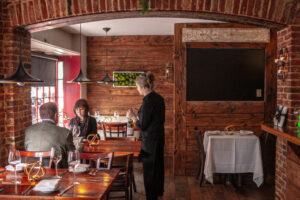
Verbena offers sophisticated dining and attentive service in an intimate setting.
Morozin’s thoughtful intention is also evident in Verbena’s dining room. “I wanted a small, intimate restaurant without distractions and gimmicks,” he says. The focus is on the food, the service, and guest experience. He loves that people walk into Verbena smiling. “People know this restaurant has a personality, a feeling behind it,” he says. “And we have to meet that expectation—never knowing what that expectation actually is.”
“We don’t want people to feel rushed,” he says. “We’re diligent about that.” His price point, which is slightly higher than that of other restaurants in the area, allows more time for guests to savor and enjoy the experience. “Usually restaurants allocate a table for one and a half hours,” he says, “but we want guests to spend two hours or more—enjoying each course as well as the moments in between the courses, the conversations, a bottle of wine. It’s how I want to eat.”
I want to put a carrot on a plate and tell people where it’s from, that it was in the dirt three hours ago.
—SCOTT MOROZIN
This is not arrogance, he says, but a deeply held belief about food, its detail, nuance—and art. “Most people see a painting and forget that there was a first stroke that sparked the idea. All the brush strokes together create a work of art.” In the dish on the plate, “some people will taste all seven spices in the pork belly,” he says. “Some will taste three—but I guarantee that everyone will taste more than one.”
Taste and See
One of Verbena’s hidden treasures is the multi-course tasting menu. “I didn’t tell people about the tasting menu for a few months after we opened,” he says. “I waited for people to ask for it.” One epic evening, a former colleague arrived at Verbena and asked for the tasting menu. Four hours and fourteen or seventeen courses later—he isn’t sure—Morozin surfaced from the kitchen triumphant. “I love to cook that way,” he says. “There’s always another side of the menu that isn’t printed. I never want to do the same dish twice, but I want the experience to be exactly the same.”

Verbena BYOB
There’s artistry and discipline in each dish. But whether guests are savoring a ten-course tasting menu or ordering à la carte, eating Alba truffles or warm, earthy dishes like Morisco, it’s all executed at the highest level and served with the same professional and attentive service in a comfortable, relaxed atmosphere. “We want to serve the best food and have fun while we’re doing it—otherwise, what’s the point? We’re professional men and women serving professional men and women. It’s important to us to remain both humble and sophisticated.”
Chef-owner Scott Morozin has given downtown Kennett Square a sophisticated destination BYOB that frames mostly local ingredients in creative combinations tweaked with contemporary techniques.
—CRAIG LEBAN, PHILLY.COM
